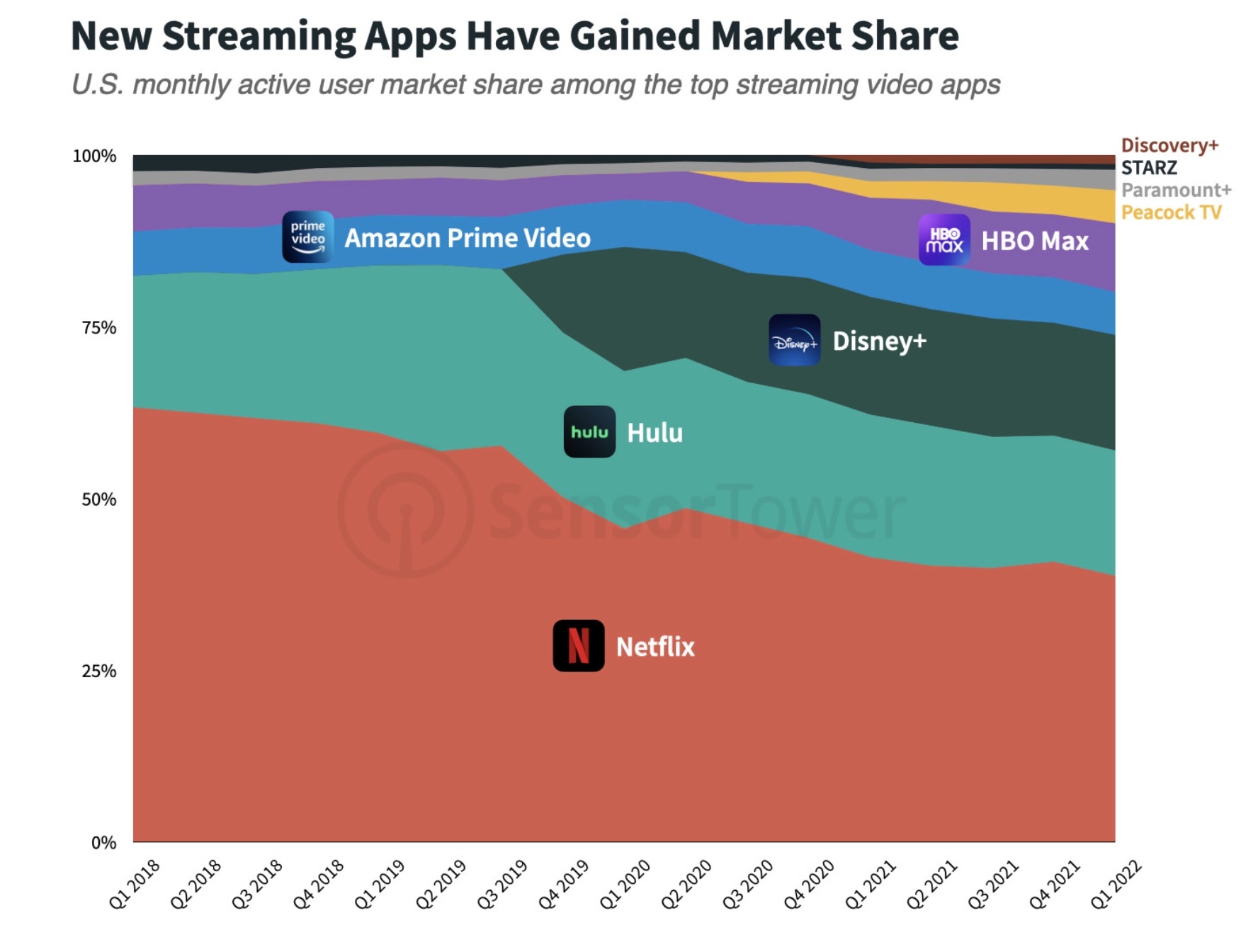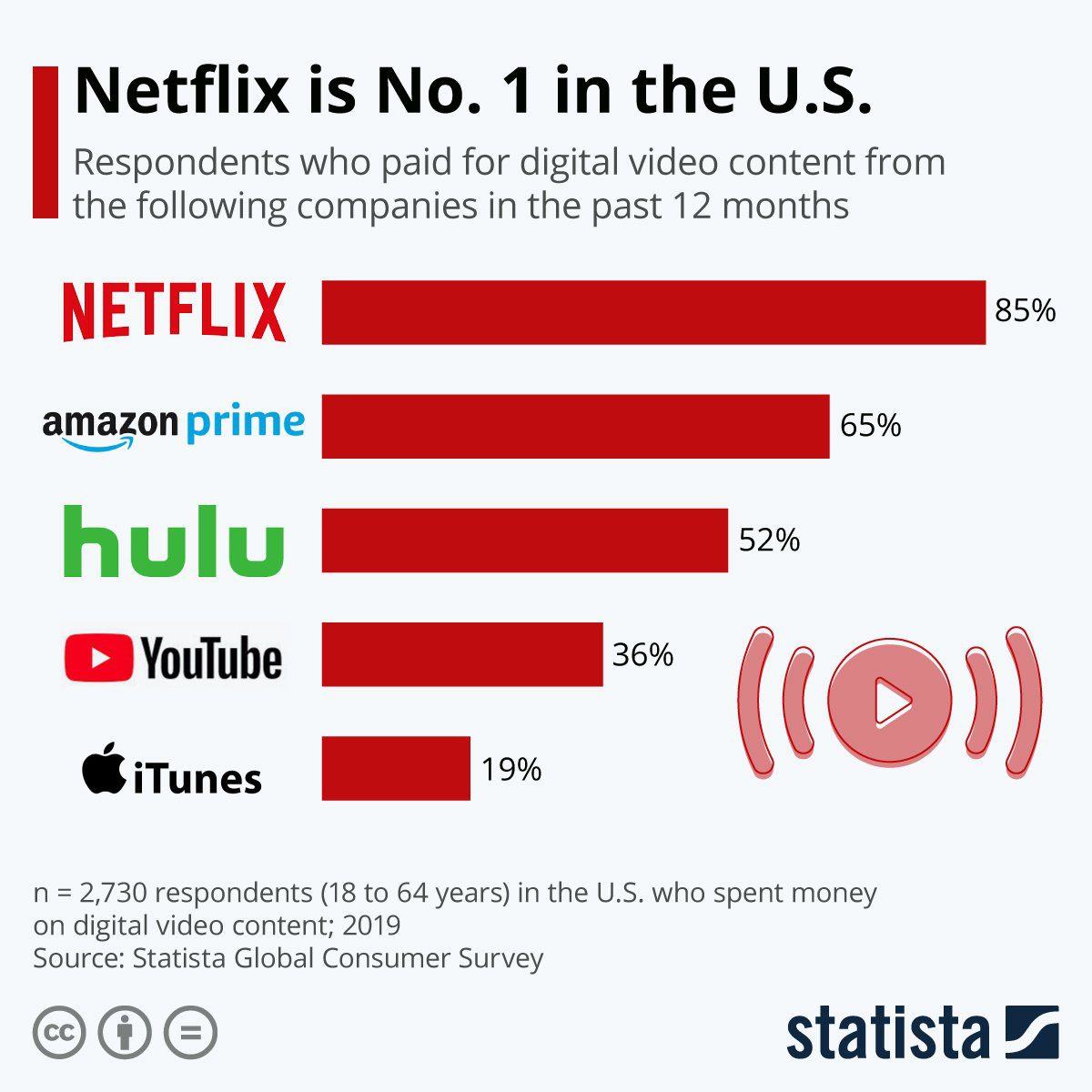Netflix Market Share: A Deep Dive Into The Streaming Giant's Dominance
Netflix has been a household name for over two decades now, revolutionizing the way we consume entertainment. The streaming giant started as a simple DVD rental service but quickly evolved into the world's leading streaming platform. Today, its market share in the global streaming industry is nothing short of impressive, and it continues to grow. But what exactly makes Netflix so dominant? Let’s uncover the secrets behind its success.
As of 2023, Netflix controls a significant portion of the global streaming market. With millions of subscribers worldwide, it's hard to ignore the impact this company has had on the entertainment industry. From original content to strategic partnerships, Netflix has managed to stay ahead of the competition despite the rise of other platforms like Disney+, Amazon Prime Video, and HBO Max.
However, the streaming industry is getting more competitive every day. New players are entering the market, and existing ones are fighting hard to capture a larger share. In this article, we’ll explore Netflix’s market share, its strategies, and what the future holds for the company. So, if you’re curious about how Netflix maintains its dominance, keep reading!
Understanding Market Share and Why It Matters
Before diving deep into Netflix's market share, let's take a moment to understand what market share actually means. In simple terms, market share refers to the percentage of an industry or market that a particular company controls. For Netflix, this means the portion of the global streaming industry where it holds sway.
Market share is crucial because it reflects a company's strength and influence within its industry. A larger market share often indicates a stronger brand, better customer loyalty, and more financial stability. For Netflix, maintaining a healthy market share is essential to keep investors happy and ensure continued growth.
So, why does Netflix's market share matter? Well, it’s not just about numbers. It’s about staying relevant in a rapidly evolving industry where new competitors emerge every year. Understanding Netflix's market share helps us see how it stacks up against other players and what strategies it employs to stay on top.
Netflix's Market Share: The Numbers You Need to Know
As of the latest reports, Netflix boasts an impressive market share in the global streaming industry. With over 238 million paid subscribers worldwide, Netflix holds a commanding position. But what do these numbers really mean?
According to Statista, Netflix controls approximately 18% of the global streaming market. While this may seem like a small percentage, it’s important to remember that the streaming industry is massive and growing rapidly. With billions of potential subscribers, even a small percentage translates to millions of users and billions in revenue.
Here’s a breakdown of Netflix’s market share in different regions:
- North America: 25%
- Europe: 20%
- Asia-Pacific: 15%
- Latin America: 30%
These numbers highlight Netflix's dominance in certain regions, particularly Latin America and North America. However, the company is also making significant inroads in Asia-Pacific, a market with immense growth potential.
The Rise of Netflix: A Brief History
To truly understand Netflix's market share, we need to look back at its history. Founded in 1997 by Reed Hastings and Marc Randolph, Netflix started as a DVD rental service. Back then, the idea of streaming movies and TV shows was still a distant dream.
In 2007, Netflix launched its streaming service, marking the beginning of a new era in entertainment. Over the years, the company has consistently innovated, investing heavily in original content and expanding its reach globally.
Today, Netflix is synonymous with streaming. Its vast library of movies, TV shows, and documentaries has captured the hearts of millions of viewers worldwide. But the journey hasn’t been easy. Netflix has faced numerous challenges, from competition to changing consumer preferences, yet it continues to thrive.
Key Milestones in Netflix's History
- 1997: Netflix is founded as a DVD rental service.
- 2007: Netflix launches its streaming service.
- 2013: Netflix produces its first original series, "House of Cards."
- 2020: Netflix surpasses 200 million subscribers globally.
These milestones showcase Netflix's evolution from a small startup to a global entertainment powerhouse. Each step has been crucial in building the company's market share and solidifying its position in the industry.
Strategies Behind Netflix's Market Share Success
So, how does Netflix maintain its market share in such a competitive industry? The answer lies in its strategies. From investing in original content to leveraging data analytics, Netflix has developed a multi-faceted approach to staying ahead.
One of the key strategies is its focus on original content. By producing high-quality shows and movies, Netflix not only attracts new subscribers but also retains existing ones. Shows like "Stranger Things," "The Witcher," and "Bridgerton" have become cultural phenomena, drawing millions of viewers worldwide.
Another important strategy is personalization. Netflix uses advanced algorithms to recommend content based on user preferences. This not only enhances the viewing experience but also keeps users engaged and coming back for more.
Investing in Original Content
Original content has been a game-changer for Netflix. By producing its own shows and movies, the company avoids licensing fees and ensures exclusive content for its subscribers. This strategy has paid off handsomely, with many Netflix originals receiving critical acclaim and awards.
Here are some of the most successful Netflix originals:
- "Stranger Things" - A sci-fi horror series that has become a cultural sensation.
- "The Witcher" - A fantasy series based on the popular book series and video games.
- "Bridgerton" - A period drama that has captivated audiences worldwide.
These shows not only boost Netflix's market share but also enhance its brand image as a leader in original content.
Challenges Facing Netflix's Market Share
Despite its success, Netflix faces several challenges that could impact its market share. The rise of new streaming platforms, changing consumer preferences, and increasing production costs are just a few of the obstacles the company must navigate.
One of the biggest challenges is competition from other streaming services. Platforms like Disney+, Amazon Prime Video, and HBO Max have been aggressively expanding their libraries and investing in original content. This has forced Netflix to up its game and find new ways to differentiate itself.
Additionally, Netflix must contend with changing consumer preferences. As viewers increasingly demand diverse and inclusive content, Netflix must ensure its offerings meet these expectations. Failure to do so could result in a loss of subscribers and market share.
Competition from Other Streaming Services
The streaming industry is more crowded than ever, with new players entering the market every year. Disney+, with its vast library of family-friendly content, has quickly become a formidable competitor. Amazon Prime Video, with its deep pockets and global reach, poses another threat. HBO Max, with its exclusive Warner Bros. content, adds to the competition.
Netflix must continue to innovate and adapt to stay ahead in this ever-changing landscape. Whether it's through new partnerships, technological advancements, or strategic acquisitions, the company must remain agile and responsive to market demands.
Future Outlook for Netflix's Market Share
Looking ahead, the future for Netflix's market share looks promising but not without challenges. The company has several initiatives in the works that could further boost its dominance in the streaming industry.
One of the most exciting developments is Netflix's expansion into gaming. By offering exclusive games to its subscribers, Netflix aims to create a more immersive entertainment experience. This could attract new users and increase engagement among existing ones.
Another area of focus is international expansion. Netflix is investing heavily in content from different regions, particularly Asia-Pacific and Latin America. By catering to local tastes and preferences, Netflix hopes to capture a larger share of these growing markets.
Expansion into Gaming
Netflix's foray into gaming is a bold move that could pay off big time. By offering games alongside its streaming service, Netflix aims to create a one-stop shop for all entertainment needs. This could help the company differentiate itself from competitors and attract a younger, tech-savvy audience.
While the gaming industry is already crowded with established players, Netflix's massive subscriber base and strong brand could give it a competitive edge. Only time will tell if this strategy will succeed, but early signs are promising.
Conclusion: Why Netflix's Market Share Matters
In conclusion, Netflix's market share is a testament to its success and dominance in the global streaming industry. From its humble beginnings as a DVD rental service to its current status as a streaming giant, Netflix has come a long way. Its focus on original content, personalization, and innovation has been key to maintaining its market share.
However, the road ahead is not without challenges. Competition from other streaming services, changing consumer preferences, and increasing production costs are just a few of the obstacles Netflix must navigate. Despite these challenges, the company remains optimistic about its future and is committed to delivering the best entertainment experience to its subscribers.
So, what can you do? If you're a Netflix subscriber, keep enjoying the amazing content the platform has to offer. If you're not, now might be the perfect time to join the millions of viewers worldwide who have already made Netflix their go-to streaming service. And don't forget to share this article with your friends and family!
Table of Contents
- Netflix Market Share: A Deep Dive into the Streaming Giant's Dominance
- Understanding Market Share and Why It Matters
- Netflix's Market Share: The Numbers You Need to Know
- The Rise of Netflix: A Brief History
- Strategies Behind Netflix's Market Share Success
- Challenges Facing Netflix's Market Share
- Future Outlook for Netflix's Market Share
- Conclusion: Why Netflix's Market Share Matters
- Expansion into Gaming
- Key Milestones in Netflix's History

Is Netflix Profitable? Netflix Profitability 20142023 FourWeekMBA

Netflix rival streaming apps now represent combined 61 of market share

Netflix Prices 2025 Chart Abellona M Bertelsen